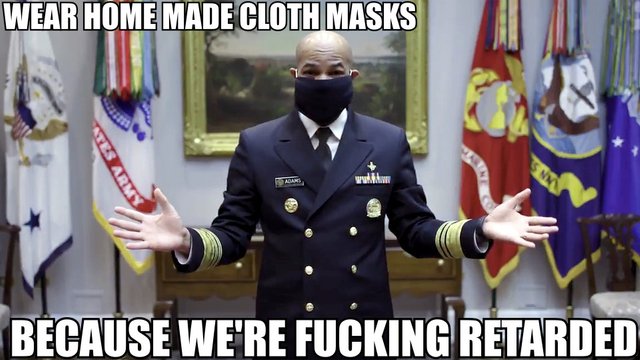
[First I'm going to explain something before posting the article. The average fabric density of cloth is 1.5 grams per cubic centimeter and with cloth you're going to absorb virus particles. 10,000 micrometers are in a centimeter. Covid-19 particles hang in the air for up to 3 hours and are between .08 to .14 of a micrometer. These will get through your masks, either exhaling or inhaling.]
"Wearing a face mask won't prevent you from getting coronavirus, but it may give you some peace of mind."
Earlier this year, the Centers for Disease Control and Prevention (CDC) issued a warning guide to Americans that the coronavirus outbreak was fast approaching. This news caused face mask sales to skyrocket, despite the fact that wearing one probably won't protect you from contracting the illness. Of course, it's considered a social norm in some cultures to wear a face mask somewhat regularly. In China, Japan, and South Korea, face masks may be worn to reduce risks associated with air pollution. They may also be worn as a way to protect others from illness in collectivist cultures. Yet more and more people are walking around wearing face masks, even as suppliers increase the prices. So why do so many people want to cover up their faces if it doesn't help? It actually has more to do with their mental health than their physical health.
We grow comfortable with the risks we take on a regular basis. Perhaps you drive your car every day. You likely don't feel scared when you get behind the wheel. You might even reply to text messages occasionally or forget to buckle up when driving. But according to statistics, driving a car is a big risk. You have about a one in 103 chance of dying in a car crash. It just doesn't feel scary because it's a familiar risk you take. The coronavirus isn't familiar. So you're uncomfortable with the risk of contracting it, and possibly dying from it. You likely have a bigger fear of it than of crashing your car. Media consumption also fuels fears. Whether scrolling through social media or flipping through channels, reports about death tolls and the speed at which coronavirus is spreading are everywhere. The more content consumed, the more likely you are to overestimate chances of contracting the coronavirus — and the more likely your anxiety levels will skyrocket.
When we feel anxious about something, we become desperate to gain some sense of control over the situation. It's a phenomenon psychologists call the "illusion of control." And research shows we often make strange decisions based on our perceived level of control. For example, research shows most people think they are less likely to get into an accident when driving a car, as opposed to being the passenger. Being in the driver's seat makes people think they can prevent accidents — even though it doesn't really guarantee this at all. Similarly, studies also show that people think they have a better chance of winning the lottery when they pick their own numbers, as opposed to allowing the computer to pick for them. Even though the numbers are drawn randomly, people are more likely to assume that having more control (picking their own numbers) increases their chances of success.
When it comes to the coronavirus, most of us likely feel we have little control over whether we contract it. And little is known about what might happen if we get it. Wearing a face mask is one way to convince ourselves that we have some control over it. We tell ourselves, "Wearing this mask decreases my chances of getting sick." This, in turn, reduces our anxiety. Rather than idly waiting for something bad to happen, we feel better if we take some sort of action. Even if the action isn't helpful, we have a way of fooling ourselves into believing that our behavior has control over the outcome. Interestingly, research also reveals the tendency to overcompensate when there are "safeguards" in place.
https://www.businessinsider.com/face-masks-wont-help-avoid-illness-so-why-wear-them-mental-health#we-overcompensate-when-safeguards-are-in-place-3
http://archive.is/j8ZVZ